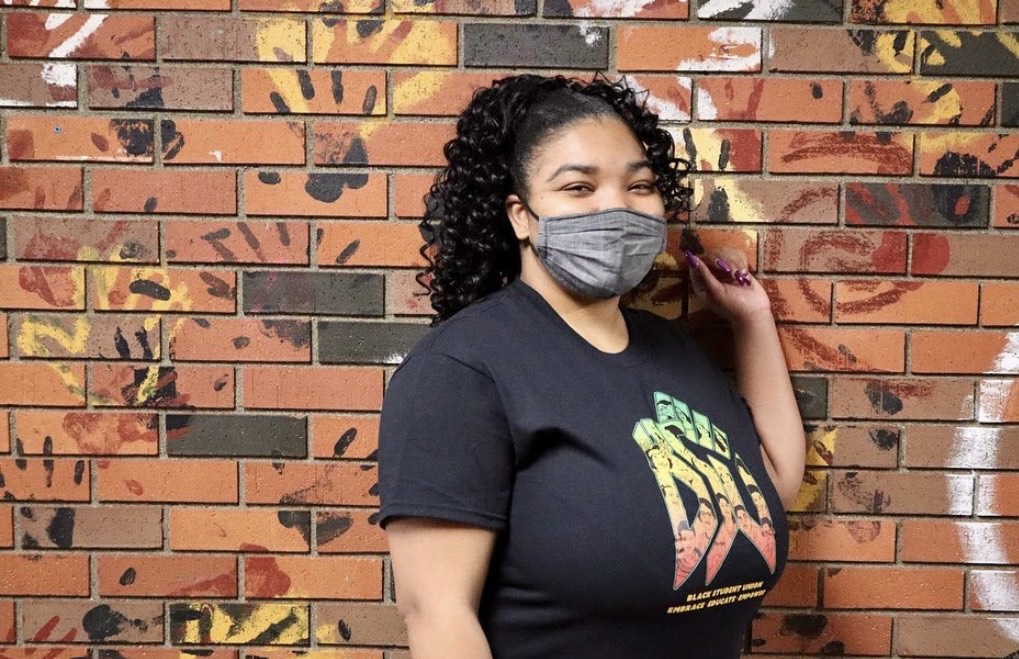DEIA Spotlight - Anaya Paschal

This month we spotlight Anaya Paschal, a senior in the Department of Ecology majoring in biology with a pre-medicine focus. Anaya moved to Bozeman during her senior year of high school. In her free time, she works with non-profit organizations statewide in various ways to better serve underrepresented communities in Montana. Anaya serves as the Black Student Union (BSU) Secretary and served as President for a full two-year term. Anaya was a part of founding Bozeman United For Racial Justice, worked heavily with university administration and staff to implement the BIPOC Action Plan, and is also involved in many cultural clubs on campus. Amid her busy schedule, Anaya generously took the time to help us get to know her and her work:
What's the one thing we need to know to know Anaya Paschal?
That I'm passionate. I set my mind to things, and no matter how long or how many tries it takes, I get the things I want to see done, done. Even if I get a million no's, even if it takes more time than it should, even if I get tired and want a break from it, if I start it and commit to it, I'll finish it.
Can you tell us about your work with the non-profit organizations around the state that better serve underrepresented communities in Montana?
I've worked mainly with two non-profits in the state: The Montana Racial Equity Project, which I've collaborated with on many events in the past, and The Forward Montana Foundation, where my goal was to get as many BIPOC people and students registered to vote as possible so that the people making legislative decisions could more reflect the population. The Montana Racial Equity Project has helped BSU with several events, such as our annual back-to-school cookout and inviting us to their trainings so that members of the BSU could better educate themselves because there is always more to learn.
Can you tell us about the Black Student Union? What are some things that you have been working on in this group?
First and foremost, BSU is a safe space for BIPOC students and Allies, with a large secondary purpose in providing education on topics not often brought up in Bozeman. This is information anyone is welcome to come and learn. As BSU president, I have collaborated with other BIPOC student groups to bolster our sense of community, namely helping the African Student Association plan their very successful African Night (which I’m hearing will be happening again this year). Along with three other BSU leaders, I also collaborated with university partners to bring the Introduction to Africana Studies (LS 194D) class to fruition. Since then, the Dean of The Graduate School has reached out to the four of us about helping with ideas to turn the class we created into a graduate certificate.
As February is Black History Month, the BSU is hosting a suite of Black History Month events and programs. Please email the BSU (bsuatmsu@gmail.com) to be added to the email list for more information.
We were told that you founded the organization Bozeman United for Racial Justice. Why did you start this organization, and what are some of the things you have done? Is there a way for others to get involved to support?
I was one of several founders of the BURJ organization. About eight of us started the organization in late May 2020 following the murder of George Floyd. After seeing the protests happening in the rest of the country, we were inspired to create change, so we began planning events for the Bozeman area. Our first two were very successful events that raised awareness of the issue to prove our point that Bozeman is a fantastic place to live. Still, we could be doing better as a city and as a community. Unfortunately, an event in late April of 2021 was my last collaboration with the organization as I took a step back to focus on school in my preparation for senior year. However, I do know they're still doing some great things.
Lastly, can you tell us a little bit about your work with the BIPOC action plan?
The BIPOC action plan began as a list of concerns from myself and two other black students. When writing these concerns down and talking about them shortly after the events of Summer 2020, we realized that there were probably other students on campus having these same concerns and issues. We invited key partners from other BIPOC student organizations and from various places in the university to join our discussions and provide their input. These conversations became a regular occurrence, and by the beginning of the fall semester, we were meeting weekly to develop a plan of action to address the acknowledged issues. By the Spring of that year, we created a team to implement these goals.
